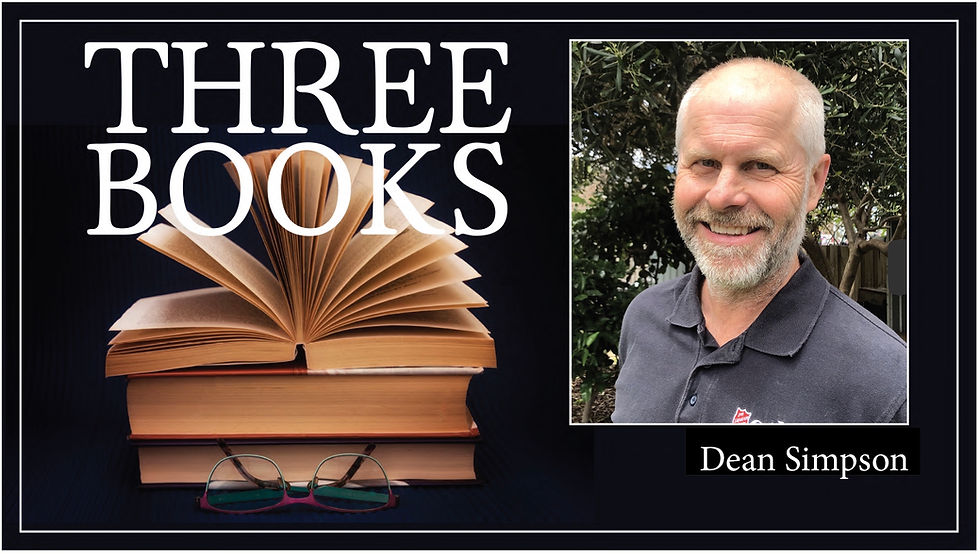Reading between the lines
- deansimpson7
- Aug 11, 2025
- 3 min read
Updated: Aug 11, 2025

Salvos Online continues a new weekly column – Three Books. Today’s guest bookworm is Dean Simpson, who heads up The Salvation Army’s Editorial Department
Besides the gospels and Psalms, which is your favourite book in the Bible and why?
I’ve always been drawn to the New Testament book of James. I don’t know if it’s because of my Salvation Army upbringing, but I’ve always seen faith and action as a ‘dynamic duo’ – they are better together. “What good is it, my brothers and sisters, if people claim to have faith but have no deeds? Can such faith save them? (James 2:14).
The fact that the book was written by Jesus’ half-brother is quite appealing – and the fact that James was not a follower of Jesus during the Saviour’s time on Earth. I love how James thought Jesus at one stage was “out of his mind” (Mark 3:21) before finally becoming a believer upon seeing Jesus alive and well after the crucifixion. And then, of course, James became one of the leaders of the church in Jerusalem.
As a young Salvo, I went with the Salvo flow, getting involved in everything. But when I started to take my faith seriously as a teenager, I would read the gospel of John and the book of James back-to-back. John and James – two pillars.
I’ve heard that the book of James is the Proverbs of the New Testament, and I can see that. James overflows with wisdom, and I never tire of it – such a powerful and practical guide to living out genuine faith.
Besides the Bible, what is a Christian book that has strongly influenced your faith?
Over the past few months, I have delved into the Reformation period of the Church. Throughout my Christian journey, I had heard of figures such as Wycliffe, Hus, Fox, Luther, Calvin, Knox, etc, but I had no idea where or when they played their part or how they all fitted together.
So, browsing at the Rozelle Markets in Sydney one Saturday with my wife, my eyes landed on the book, God’s Generals – The Roaring Reformers, ($8 bargain).
Roberts Liardon’s book is a highly inspiring read, especially if you’re interested in church history. The struggles these spirit-filled men faced as they sought to revive the beliefs and principles of the early church were staggering – periods of enlightenment alongside intense persecution. They truly sacrificed everything in their fight, not only for the truth of God’s Word but also to ensure the Word reached ordinary people in a translation they understood.
I no longer take for granted my Bible, which at times had sat there on my bedside table gathering dust, or my freedom to worship anywhere, anytime.
What is a secular book that has revealed to you a Christian message or theme?
I read heaps of books ... and sometimes have three or four on the go at once, both fiction and non-fiction. So, when my teenage son handed me a strange little book called The Alchemist and said, “Read this one,” I wasn’t expecting much. Boy, was I wrong. My son says it’s the best book he’s ever read, and after a few engrossing hours, I see what he’s getting at. The Alchemist is a novel by Brazilian author Paulo Coelho, originally written in Portuguese, and first published in 1988.
The storyline is simple – it follows Santiago, a shepherd boy, on his journey across North Africa to the pyramids of Egypt after he dreams of finding treasure there. But it’s the symbolism and philosophy woven through the narrative that captures the reader’s interest, highlighting basic themes of selfishness, love, dreams and aspirations.
The core of the book, however, is about discovering one’s destiny, suggesting that the journey, rather than the destination, is where true growth and learning take place – a concept that aligns with the Christian emphasis on spiritual development through trials and tribulations.
While not a Christian book, it does touch on Christian themes, highlighting parallels with biblical figures and concepts (does Santiago’s role as a shepherd directly parallel Jesus’ depiction as the shepherd of his flock?). There are also biblical themes of divine guidance, faith and perseverance, and the interconnectedness with a “soul of the world”.
I’ve now read the book several times and found it to be a treasure chest, uncovering a new ‘jewel’ each time – almost like the never-ending treasure of the Word of God. It’s no substitute for the Bible, however, and probably offers a more universal spirituality, implying that God can be found across different cultures and interpretations.
But in the end, it’s an entertaining and adventurous little book (only about 200 pages), and, for a Christian, made even more captivating by its subtle biblical parallels.






